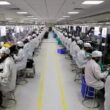As electric vehicles reshape the auto industry, Toyota’s legendary supply chain faces new challenges. Is it an asset that will ensure its dominance, or a liability that could hinder its progress? Explore the complexities and future of Toyota’s strategic decisions.
Navigating the EV Revolution: Toyota’s Supply Chain at a Crossroad
With the rise of electric vehicles (EVs), Toyota stands at a critical juncture, grappling with the future of its renowned supply chain. The automaker’s recent unveiling of next-generation internal combustion engines (ICEs) underscores its commitment to hybrids, but raises questions about its long-term strategy in a rapidly evolving market.
Balancing Tradition with Innovation
Toyota’s “just-in-time” supply chain has been pivotal to its success, facilitating lean production and global adoption. This approach, while efficient, ties Toyota to its extensive network of suppliers. Koji Sato, Toyota’s CEO, emphasized the importance of this relationship, stating, “It is important for us to make clear which direction we are going to create a future together with these companies.”
However, this interdependence can be a double-edged sword. While it supports millions of auto-related jobs in Japan, it may also limit Toyota’s agility in responding to market shifts, particularly the rapid adoption of EVs.
The Broader Economic Context
The auto industry is deeply intertwined with national economies. In Japan, it accounts for 2.9% of GDP and 13.9% of manufacturing GDP, supporting 5.5 million jobs. This economic significance creates a safety net, as governments are unlikely to let such crucial industries fail.
Thomas Besson, head of autos research at Kepler Cheuvreux, highlighted the political dimension, stating, “Automaking is a highly political industry…it’s a bit like steel or banks or ships, you just don’t do it.”
The EV Challenge
The transition to EVs presents both opportunities and risks. A 2021 PwC study estimated that a complete switch to EV production in Europe by 2035 could result in a net loss of 274,000 jobs, as fewer components are required for EVs compared to ICE vehicles.
James Hong, an autos analyst at Macquarie, warned of the impending danger, noting that “the danger point could arrive sooner than they are planning for due to EVs and China ramping up competition and supply even quicker than was estimated.”
Strategic Implications for Toyota
Toyota’s defense of its supply chain reflects its strategic bet on hybrids and its attempt to hedge against regulatory and market uncertainties. Yet, the very strengths of its supply chain could become liabilities if they inhibit innovation and adaptability in the fast-evolving automotive landscape.
What are your thoughts on Toyota’s strategy? Do you believe its supply chain will adapt to the EV revolution, or will it become a burden? Share your insights and join the discussion in the comments below.










I think this artical is really insightful! It makes me ponder how Toyota will manage its supply chain with all the changes in the EV market. Their commitment to hybrid cars is smart but what about EVs? Exciting times ahead!
This post is too negative! Toyota has always been a leader in the automotive industry and I believe they can adapt just fine. All this talk about challenges makes it seem like they’re doomed, which is not true at all!
While I appreciate the depth of this article, it seems to ignore some key facts about the automotive supply chain. The shift towards EVs is complex, and simply blaming Toyota’s strategy doesn’t address the bigger picture.
Totally agree with you Reuben! The auto industry is changing rapidly, but pointing fingers at one company won’t help solve the issues at hand. We need broader solutions for these challenges.
This whole discussion about Toyota’s supply chain sounds like a bad joke to me. They always found ways to innovate, so why should we worry? Just because EVs are trending doesn’t mean they will fail!
‘Innovation’ seems overused now! If it’s so easy, why are other automakers struggling too? Maybe it’s time to stop making excuses for them and face reality.
‘A bad joke’? More like a comedy show! If they can’t keep up with the trends then what’s next? They should be ready to go or get left behind like old tech!
‘The danger point could arrive sooner’ sounds dramatic, don’t you think? It’s almost like watching a suspense movie where we all know Toyota will figure it out eventually!
Yeah Taslima, I mean it’s just a car company right? What could possibly go wrong? Let’s just get our popcorn and enjoy the ride of their ‘dramatic’ journey ahead.